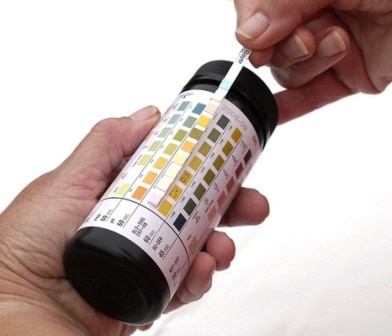User login
LAS VEGAS – The majority of patients with proteinuria who are admitted to hospitals affiliated with academic medical centers are not placed on life-prolonging therapy, results from a small study showed.
In addition, the 41% of patients with the condition were taking NSAIDS, which can worsen kidney function.
"Recognizing proteinuria and initiating the appropriate treatment are extremely important," Dr. Vishesh Kumar, a resident physician at Albany (N.Y.) Medical College, said in an interview following a meeting sponsored by the National Kidney Foundation, where the study was presented.
"If left untreated, proteinuria has been associated with cardiovascular mortality and progression of kidney disease. Both are very poor outcomes, and both can be either slowed in their onset, or in some cases prevented altogether. Our study has shed some light onto the scope of the problem."
Dr. Kumar, along with Dr. Arif Asif, professor of medicine at the medical college, and their associates conducted a multicenter retrospective study that set out to identify patients admitted to the hospital service with proteinuria and to establish whether they were optimally treated. "We know that it is easy to screen for proteinuria using a simple urine dipstick," he said. "We also have several antiproteinuric agents [to use] such as ACE [angiotensin-converting enzyme] inhibitors, angiotensin II receptor blockers, spironolactone, diltiazem, and verapamil. These medications have been shown in landmark trials in nephrology to help to reduce proteinuria, improve cardiovascular mortality, and slow the progression of kidney disease."
The study population included 298 patients (mean age, 60 years) who were admitted to two hospitals over a 6-month period. Of the 298 patients, 199 (66%) were confirmed to have proteinuria. Of these, 74 (37%) were treated with an antiproteinuric agent, and 81 (41%) were taking NSAIDs. Dr. Kumar said that he and his colleagues were very surprised "by the fact that many patients with proteinuria were taking NSAIDs, which can worsen proteinuria, and many of which are available over the counter. We have a huge opportunity for improvement of care in these patients."
He also reported that 63 of the patients (32%) had proteinuria and hypertension. Among this subset of patients, only 27 (43%) received an antiproteinuric agent.
Dr. Kumar acknowledged that certain limitations of the study, including its small sample size and the fact that "we did not collect any data involving these patients’ primary care. One could generalize that patients that come into hospital may not have as good a relationship with primary care providers and may not be screened with a urine analysis as an outpatient as frequently. Many of these things can be addressed in future studies."
The researchers reported having no financial conflicts of interest.
My question about this study is, "Why was the patient admitted to the hospital?" If proteinuria was an incidental finding because the patient presented with a fever and abdominal pain (so a urinalysis was performed to investigate a bladder infection), I am not sure it is so important to address the proteinuria during the index hospitalization.
 |
|
Of course, such findings must and should be reported in a discharge summary and referred to the PCP at follow-up for confirmation and treatment. But there is no immediate need to deal with the proteinuria (i.e., there are no adverse consequences if the treatment is delayed 1-2 weeks) if there are other more pressing issues for the hospitalist to address.
Many hospitalists are reluctant to begin new medications that are not directly tied to the primary reason for hospitalization. The transition of care at discharge already is a time-intensive process if done correctly. Adding multiple new medications (such as an ACE inhibitor plus an antibiotic, for example) will increase the time needed for education, raise the cost to the patient, etc. – all when the PCP may disagree with the ACE inhibitor chosen by the hospitalist (he or she may prefer an angiotensin II receptor blocker, for example).
Dr. Franklin A. Michota Jr. is director of academic affairs in the department of hospital medicine, and medical editor of Hospitalist News.
My question about this study is, "Why was the patient admitted to the hospital?" If proteinuria was an incidental finding because the patient presented with a fever and abdominal pain (so a urinalysis was performed to investigate a bladder infection), I am not sure it is so important to address the proteinuria during the index hospitalization.
 |
|
Of course, such findings must and should be reported in a discharge summary and referred to the PCP at follow-up for confirmation and treatment. But there is no immediate need to deal with the proteinuria (i.e., there are no adverse consequences if the treatment is delayed 1-2 weeks) if there are other more pressing issues for the hospitalist to address.
Many hospitalists are reluctant to begin new medications that are not directly tied to the primary reason for hospitalization. The transition of care at discharge already is a time-intensive process if done correctly. Adding multiple new medications (such as an ACE inhibitor plus an antibiotic, for example) will increase the time needed for education, raise the cost to the patient, etc. – all when the PCP may disagree with the ACE inhibitor chosen by the hospitalist (he or she may prefer an angiotensin II receptor blocker, for example).
Dr. Franklin A. Michota Jr. is director of academic affairs in the department of hospital medicine, and medical editor of Hospitalist News.
My question about this study is, "Why was the patient admitted to the hospital?" If proteinuria was an incidental finding because the patient presented with a fever and abdominal pain (so a urinalysis was performed to investigate a bladder infection), I am not sure it is so important to address the proteinuria during the index hospitalization.
 |
|
Of course, such findings must and should be reported in a discharge summary and referred to the PCP at follow-up for confirmation and treatment. But there is no immediate need to deal with the proteinuria (i.e., there are no adverse consequences if the treatment is delayed 1-2 weeks) if there are other more pressing issues for the hospitalist to address.
Many hospitalists are reluctant to begin new medications that are not directly tied to the primary reason for hospitalization. The transition of care at discharge already is a time-intensive process if done correctly. Adding multiple new medications (such as an ACE inhibitor plus an antibiotic, for example) will increase the time needed for education, raise the cost to the patient, etc. – all when the PCP may disagree with the ACE inhibitor chosen by the hospitalist (he or she may prefer an angiotensin II receptor blocker, for example).
Dr. Franklin A. Michota Jr. is director of academic affairs in the department of hospital medicine, and medical editor of Hospitalist News.
LAS VEGAS – The majority of patients with proteinuria who are admitted to hospitals affiliated with academic medical centers are not placed on life-prolonging therapy, results from a small study showed.
In addition, the 41% of patients with the condition were taking NSAIDS, which can worsen kidney function.
"Recognizing proteinuria and initiating the appropriate treatment are extremely important," Dr. Vishesh Kumar, a resident physician at Albany (N.Y.) Medical College, said in an interview following a meeting sponsored by the National Kidney Foundation, where the study was presented.
"If left untreated, proteinuria has been associated with cardiovascular mortality and progression of kidney disease. Both are very poor outcomes, and both can be either slowed in their onset, or in some cases prevented altogether. Our study has shed some light onto the scope of the problem."
Dr. Kumar, along with Dr. Arif Asif, professor of medicine at the medical college, and their associates conducted a multicenter retrospective study that set out to identify patients admitted to the hospital service with proteinuria and to establish whether they were optimally treated. "We know that it is easy to screen for proteinuria using a simple urine dipstick," he said. "We also have several antiproteinuric agents [to use] such as ACE [angiotensin-converting enzyme] inhibitors, angiotensin II receptor blockers, spironolactone, diltiazem, and verapamil. These medications have been shown in landmark trials in nephrology to help to reduce proteinuria, improve cardiovascular mortality, and slow the progression of kidney disease."
The study population included 298 patients (mean age, 60 years) who were admitted to two hospitals over a 6-month period. Of the 298 patients, 199 (66%) were confirmed to have proteinuria. Of these, 74 (37%) were treated with an antiproteinuric agent, and 81 (41%) were taking NSAIDs. Dr. Kumar said that he and his colleagues were very surprised "by the fact that many patients with proteinuria were taking NSAIDs, which can worsen proteinuria, and many of which are available over the counter. We have a huge opportunity for improvement of care in these patients."
He also reported that 63 of the patients (32%) had proteinuria and hypertension. Among this subset of patients, only 27 (43%) received an antiproteinuric agent.
Dr. Kumar acknowledged that certain limitations of the study, including its small sample size and the fact that "we did not collect any data involving these patients’ primary care. One could generalize that patients that come into hospital may not have as good a relationship with primary care providers and may not be screened with a urine analysis as an outpatient as frequently. Many of these things can be addressed in future studies."
The researchers reported having no financial conflicts of interest.
LAS VEGAS – The majority of patients with proteinuria who are admitted to hospitals affiliated with academic medical centers are not placed on life-prolonging therapy, results from a small study showed.
In addition, the 41% of patients with the condition were taking NSAIDS, which can worsen kidney function.
"Recognizing proteinuria and initiating the appropriate treatment are extremely important," Dr. Vishesh Kumar, a resident physician at Albany (N.Y.) Medical College, said in an interview following a meeting sponsored by the National Kidney Foundation, where the study was presented.
"If left untreated, proteinuria has been associated with cardiovascular mortality and progression of kidney disease. Both are very poor outcomes, and both can be either slowed in their onset, or in some cases prevented altogether. Our study has shed some light onto the scope of the problem."
Dr. Kumar, along with Dr. Arif Asif, professor of medicine at the medical college, and their associates conducted a multicenter retrospective study that set out to identify patients admitted to the hospital service with proteinuria and to establish whether they were optimally treated. "We know that it is easy to screen for proteinuria using a simple urine dipstick," he said. "We also have several antiproteinuric agents [to use] such as ACE [angiotensin-converting enzyme] inhibitors, angiotensin II receptor blockers, spironolactone, diltiazem, and verapamil. These medications have been shown in landmark trials in nephrology to help to reduce proteinuria, improve cardiovascular mortality, and slow the progression of kidney disease."
The study population included 298 patients (mean age, 60 years) who were admitted to two hospitals over a 6-month period. Of the 298 patients, 199 (66%) were confirmed to have proteinuria. Of these, 74 (37%) were treated with an antiproteinuric agent, and 81 (41%) were taking NSAIDs. Dr. Kumar said that he and his colleagues were very surprised "by the fact that many patients with proteinuria were taking NSAIDs, which can worsen proteinuria, and many of which are available over the counter. We have a huge opportunity for improvement of care in these patients."
He also reported that 63 of the patients (32%) had proteinuria and hypertension. Among this subset of patients, only 27 (43%) received an antiproteinuric agent.
Dr. Kumar acknowledged that certain limitations of the study, including its small sample size and the fact that "we did not collect any data involving these patients’ primary care. One could generalize that patients that come into hospital may not have as good a relationship with primary care providers and may not be screened with a urine analysis as an outpatient as frequently. Many of these things can be addressed in future studies."
The researchers reported having no financial conflicts of interest.
AT SCM 14

